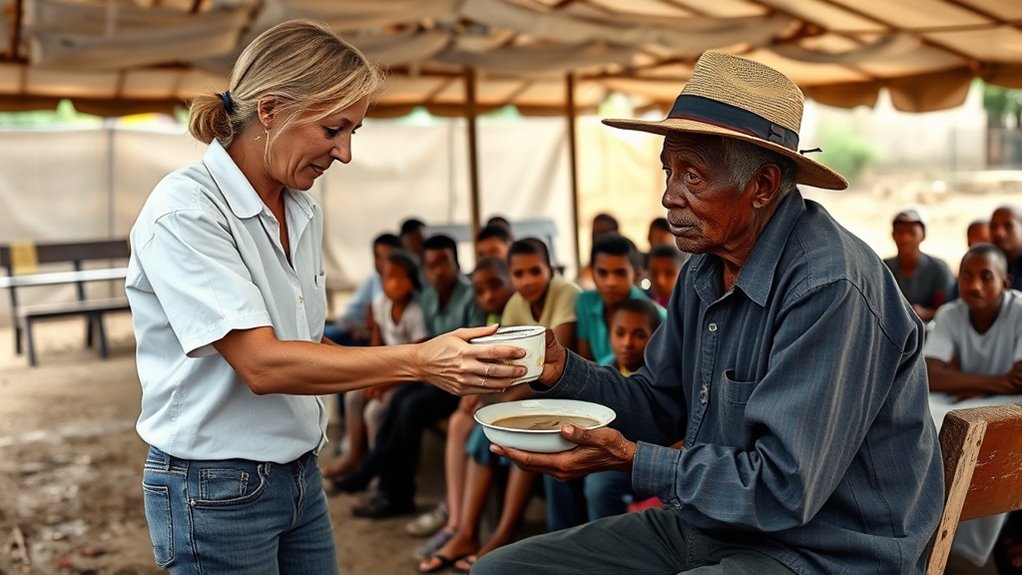By actively serving others, you live out the Gospel’s call to love and care for the poor and needy through tangible deeds. Whether it’s offering kindness, volunteering, or sharing resources, your actions reflect Christ’s compassion and foster meaningful connections. Overcoming barriers like fear or time constraints helps you make a real difference. Partnering with community organizations and seeking divine guidance enhances your impact. To discover more ways to embody faith through service, keep exploring how these actions transform lives.
Key Takeaways
- Embrace biblical teachings on charity and servanthood to demonstrate genuine faith through compassionate actions.
- Cultivate empathy and cultural sensitivity to connect authentically with those in need and honor their dignity.
- Build relationships and trust through active listening, shared stories, and ongoing community engagement.
- Partner with organizations, manage resources wisely, and coordinate efforts to maximize impact and sustainability.
- Pray regularly for guidance, humility, and patience, aligning your service with God’s will to truly live out the Gospel.
Understanding the Biblical Call to Serve

The Bible clearly emphasizes the importance of serving others, especially the poor and needy. It calls you to act with compassion and generosity, reminding you that true faith is demonstrated through deeds. Motivational quotes often highlight this divine mandate, inspiring you to make a difference. Participating in charity events is a practical way to live out these teachings, showing love in tangible ways. When you serve, you reflect God’s heart and fulfill His command to care for the least of these. Remember, service isn’t just about giving material things; it’s about embodying Christ’s love in your actions. Additionally, understanding the biblical teachings on charity can deepen your commitment to helping others. By embracing this biblical call, you become a beacon of hope and a witness to the transformative power of kindness. Cultivating a mindset aligned with the Law of Attraction Resource Guide can further enhance your ability to manifest opportunities for service and generosity. Recognizing the significance of angel numbers can also inspire and guide your acts of kindness, reminding you of divine support in your efforts. Exploring dog names can be a joyful way to reflect your personality and values, which can also inspire your compassionate actions. Moreover, considering the safe sleep guidelines for newborns encourages a nurturing and caring attitude, reflecting the love and protection we are called to provide to those in need.
The Heart of Compassion in Action

Your genuine empathy compels you to take meaningful action, showing true care for those in need. When your acts mirror your inner compassion, they become powerful demonstrations of love. Serving others becomes a spiritual practice that transforms both your heart and theirs. Embracing effective tools and strategies can maximize your impact and ensure your assistance reaches those who need it most. Recognizing the importance of digital literacy programs can help bridge generational gaps and foster more meaningful connections in service. Incorporating portable camping gear such as tents or power sources can also facilitate outreach efforts in remote or underserved areas, enabling you to provide lasting support that truly meets people’s needs. Utilizing email marketing techniques can help you coordinate and expand your outreach efforts more efficiently.
Genuine Empathy Drives Action
Genuine empathy is the catalyst that transforms concern into meaningful action. When you develop empathy, you deepen your understanding of others’ feelings and struggles, fueling your desire to help. Building emotional intelligence allows you to recognize and manage your own emotions while responding sensitively to those in need. This awareness drives authentic compassion, motivating you to serve with sincerity. By actively listening and connecting on a personal level, you demonstrate that you truly care. Your ability to empathize makes your actions more impactful, ensuring that your efforts aren’t just acts of charity but expressions of heartfelt concern. Cultivating a compassionate mindset also encourages respect for environmental considerations, which is essential for sustainable service. Developing visualization skills can further enhance your capacity to understand and meet others’ needs more effectively. Ultimately, empathy guides you to serve not just out of obligation but from a genuine desire to make a difference.
Acts Reflect Inner Compassion
When empathy moves from feeling to action, it reveals the true depth of your inner compassion. Your emotional intelligence allows you to recognize others’ needs genuinely, going beyond surface-level sympathy. Acts of kindness become meaningful when driven by this awareness, reflecting your heartfelt concern. Cultural sensitivity plays a vital role, ensuring your actions respect different backgrounds and experiences. By understanding diverse perspectives, you demonstrate that your compassion isn’t superficial but rooted in authentic care. Your deeds speak volumes about your character, showing that your inner compassion isn’t just a feeling but a tangible force for good. When your actions align with your empathy, you embody the Gospel’s call to love and serve with sincerity and respect. Cultivating empathy enhances your ability to serve effectively and compassionately. Recognizing the importance of climate control principles can also foster a sense of responsibility and stewardship in caring for others and creation. Understanding the wicks in candles, for instance, emphasizes the importance of attention to detail and safety in acts of service and craftsmanship. Incorporating renewable energy awareness into your mindset can inspire sustainable practices that benefit both people and the environment. Additionally, being mindful of environmental sustainability can deepen your commitment to long-term compassionate action.
Servanthood as Spiritual Practice
Servanthood stands at the core of authentic spiritual practice, transforming compassion from a feeling into concrete action. When you embrace servanthood as a spiritual discipline, you practice humility in servanthood, putting others’ needs above your own. This mindset shifts your approach from obligation to genuine care, fostering a deeper connection with those you serve. Servanthood becomes a daily act of surrender, helping you grow in patience, empathy, and humility. By cultivating this spiritual discipline, you demonstrate that true service isn’t about recognition but about embodying Christ’s love. Engaging in acts of service can also improve your overall well-being by reducing stress and fostering a sense of purpose and emotional resilience. When you see service as a spiritual practice, it transforms your heart and moves you closer to living out the Gospel in deeds, reflecting authentic compassion in every action. Recognizing the importance of mindset can enhance your ability to serve with sincerity and consistency. Developing a servant leadership mindset encourages humility and prioritizes the needs of others above personal gain. Additionally, understanding Deaf Vibes and related techniques can deepen your awareness of diverse communication needs, fostering more inclusive and compassionate service. Incorporating mindful decluttering strategies into your life can also help create space for intentional acts of kindness and service, reinforcing the importance of mindfulness in action.
Practical Ways to Assist Those in Need

Have you ever wondered how small actions can make a big difference in someone’s life? One practical way is by exploring volunteering opportunities in your community. Volunteering allows you to directly support those in need, whether through food drives, shelters, or outreach programs. Additionally, managing resources wisely can amplify your impact. This includes donating your time, skills, or goods thoughtfully, ensuring they reach those who need them most. You can also organize or join efforts that maximize resources, like food pantries or clothing drives. Simple acts like listening with compassion or offering your skills can genuinely uplift someone’s spirit. By combining active volunteering with mindful resource management, you become a powerful instrument of Christ’s love, showing care through tangible deeds. Recognizing the value of effective resource allocation can help you serve others more efficiently and sustainably. Embracing community engagement can further deepen your impact and foster lasting relationships with those you serve, especially when you incorporate wall organization strategies to coordinate efforts and resources effectively. Furthermore, understanding emotional support principles can enhance your ability to provide comfort and reassurance to those facing hardships.
Building Relationships Through Service

Building relationships through service transforms simple acts of help into meaningful connections. When you engage in community outreach, you show genuine care that fosters trust and understanding. Volunteer coordination plays a key role by organizing efforts that encourage ongoing interaction. As you serve alongside others, bonds strengthen, creating a sense of shared purpose. To illustrate, consider this table:
| Action | Impact | Connection |
|---|---|---|
| Listening actively | Builds trust and respect | Deepens relationships |
| Sharing stories | Fosters empathy | Creates understanding |
| Collaborating | Promotes teamwork | Strengthens community |
Through these efforts, your acts of service become more than aid—they become bridges that unite you with those you serve.
Overcoming Barriers to Helping Others

Many people want to help others, but various barriers can make it difficult to take action. Fear of inadequacy or feeling unprepared often holds you back from engaging in community outreach or volunteer coordination. Time constraints and busy schedules may seem like obstacles, but prioritizing service can help overcome these challenges. You might also encounter logistical issues, such as lack of information about where help is needed. To overcome these barriers, seek out local organizations and stay informed about opportunities. Building relationships within your community can boost confidence and make volunteering more manageable. Remember, even small acts of kindness have a ripple effect. By staying committed and organized, you can turn intentions into meaningful deeds that serve the needy.
The Role of Prayer in Service Efforts

Prayer serves as your spiritual preparation before serving others, helping you align your heart with compassion. It guides you to seek divine insight, ensuring your actions reflect true kindness. Through prayer’s power, you find strength and clarity to serve with genuine love.
Prayer as Spiritual Preparation
Before engaging in service efforts for the poor and needy, prayer serves as an essential form of spiritual preparation. It helps you center your heart, renew your faith, and strengthen your resolve. Through prayer, you cultivate a spiritual discipline that deepens your connection with God and clarifies your purpose. It also prepares you mentally and emotionally to serve with humility and compassion.
Consider these ways prayer helps you prepare:
- Focuses your mind on Christ’s love and compassion
- Opens your heart to divine guidance
- Reinforces your commitment to service
- Provides peace amid challenging circumstances
Seeking Divine Guidance
As you prepare to serve the poor and needy, seeking divine guidance becomes a vital step in aligning your efforts with God’s will. Prayer helps cultivate biblical patience, reminding you to trust God’s timing and remain steadfast amid challenges. It also sharpens your spiritual discernment, allowing you to recognize where your help is most needed and how to approach each situation with wisdom. Through prayer, you open your heart to God’s direction, ensuring your actions reflect genuine compassion rather than assumptions. This connection with God guides you to serve effectively, compassionately, and humbly. Remember, seeking divine guidance isn’t a one-time act but a continual process that deepens your understanding and commitment to living out the Gospel through deeds.
Prayer’s Power in Compassion
When you actively pray before and during your service efforts, you tap into a powerful source of compassion that transforms your approach to helping others. Prayer strengthens your faith and reminds you that service is rooted in divine mercy and grace. It sharpens your focus on the needs of others, fostering genuine empathy. Prayer also helps you surrender control, trusting that God’s guidance will lead your actions.
- It renews your motivation to serve selflessly
- It cultivates humility and patience
- It deepens your connection to God’s love
- It empowers you to act with mercy and grace in every encounter
Partnering With Community Organizations

Partnering with community organizations is essential for effectively serving the poor and needy. By collaborating, you can streamline efforts through volunteer coordination, ensuring resources are used efficiently and volunteers are engaged meaningfully. Building strong partnerships allows you to leverage the strengths of each organization, creating a greater impact. You can also develop innovative fundraising strategies together to support ongoing projects and new initiatives. Sharing expertise and resources helps avoid duplication and maximizes outreach. When you work hand-in-hand with local groups, your efforts become more sustainable and targeted. Remember, successful partnerships depend on clear communication, mutual trust, and a shared commitment to serving those in need. Together, you can make a lasting difference in your community’s most vulnerable populations.
Sharing Resources Wisely and Fairly

Building strong partnerships with community organizations sets the stage for sharing resources effectively. To do this, you need to prioritize fair resource allocation, ensuring every person’s needs are met without waste. Develop your financial literacy to understand how to manage donations and funds wisely, so resources are used most effectively. Be transparent about how resources are distributed, fostering trust and accountability. Consider the community’s specific needs and adapt your strategies accordingly. Remember, fair sharing isn’t just about giving; it’s about empowering individuals and strengthening the entire community.
- Assess needs carefully before allocating resources
- Educate yourself and others on financial literacy
- Promote transparency in resource distribution
- Collaborate to maximize impact and fairness
Testimonies of Transformation and Hope

You’ll find powerful stories of change that remind us how acts of kindness can transform lives. These testimonies reveal miracles made possible through service and compassion. They inspire us to continue our efforts and believe in the hope that kindness can bring.
Personal Stories of Change
Personal stories of change reveal the profound impact of compassion and support on individuals facing hardship. When someone receives help with food security or housing solutions, their outlook begins to shift. You might hear how a simple act—like providing a nourishing meal or a safe place to stay—restores hope and dignity. These stories showcase resilience, faith, and newfound purpose.
- A family regains stability after secure housing is found.
- An individual moves from hunger to self-sufficiency through community support.
- A young person discovers purpose by volunteering and giving back.
- A mother finds peace knowing her children are safe and fed.
These transformations remind us that small acts of kindness can ignite lasting change in someone’s life.
Miracles Through Service
Miracles through service happen when simple acts of kindness transform lives in ways that seem almost miraculous. Through faith-based outreach, your volunteer engagement can create powerful moments of hope and renewal. When you serve others with genuine compassion, you help meet immediate needs and plant seeds of faith that inspire lasting change. Many who have experienced these acts report life-altering transformations, discovering a renewed sense of purpose and belonging. These stories highlight how service can break barriers, restore dignity, and deepen spiritual connection. The true miracle lies in the ripple effect—each act of kindness encourages others to get involved, fostering a community rooted in love and faith. Your willingness to serve can change lives in ways you may never fully see but will always be a part of.
Inspiring Acts of Kindness
Inspiring acts of kindness have the power to transform lives and renew hope in the most unexpected ways. When you engage in community outreach, your small actions can spark big change, showing others the love of Christ through tangible deeds. Volunteer coordination makes it easier to organize efforts, ensuring help reaches those who need it most. These acts create testimonies of hope, proving that compassion can heal wounds and build bridges. Your involvement might include:
- Distributing food and essentials to the homeless
- Mentoring youth in underserved communities
- Organizing prayer and support groups
- Coordinating efforts with local churches and charities
Each act, no matter how small, can inspire others to follow your example, igniting a ripple effect of kindness and renewal.
Encouraging Others to Live Out Their Faith

Encouraging others to live out their faith requires more than just words; it calls for genuine example and heartfelt support. You can inspire others through your actions, demonstrating the importance of faith-based volunteering and spiritual stewardship. Share your experiences and invite others to join you in service, showing that faith is active and impactful. When you live out your beliefs openly, you encourage others to do the same, creating a ripple effect of compassion and dedication. Recognize the unique gifts each person brings and support their journey of faith. By leading with humility and love, you help others see how living out their faith makes a difference in the lives of the poor and needy.
Frequently Asked Questions
How Can I Start Serving the Poor With Limited Resources?
If you’re wondering how to start serving the poor with limited resources, consider forming community partnerships with local organizations. You can also engage in skill-based volunteering, offering your expertise to make a difference. Even small actions matter; donate time or skills, and connect with others who share your passion. By working together, you’ll maximize your impact and effectively serve those in need, regardless of your resource constraints.
What Emotional Challenges Might I Face When Helping Others?
When helping others, you might face emotional challenges like compassion fatigue, which can drain your emotional resilience. You may feel overwhelmed by others’ struggles or experience guilt if you can’t meet all their needs. Staying aware of your feelings helps you maintain balance. Remember to practice self-care and set boundaries, so you can continue serving effectively without burning out. Building emotional resilience guarantees you stay compassionate and strong.
How Do I Balance Service With My Personal Responsibilities?
Balancing service with your personal responsibilities can seem overwhelming, but you can manage it effectively. Start with strong time management, allocating specific periods for service and personal tasks. Remember to set boundaries; it’s okay to say no when your limits are reached. Visualize your priorities clearly, ensuring you dedicate quality time to both. By doing so, you stay committed to serving others while honoring your personal commitments.
What Are Signs of Burnout Among Those Serving Others?
You might notice signs of burnout like compassion fatigue and spiritual exhaustion when serving others. You feel overwhelmed, emotionally drained, or detached from your work. You may lose motivation or feel guilty for taking breaks. These signs indicate you need to pause, rest, and reconnect with your faith. Recognizing these symptoms early helps you maintain your well-being and continue serving effectively without risking burnout.
How Can Children Participate Meaningfully in Service Efforts?
You can encourage children to participate meaningfully in service efforts by involving them in age-appropriate teen volunteerism, where they can learn compassion firsthand. Family involvement enhances their understanding and commitment, making service a shared value. By guiding them to contribute their skills and time, you help cultivate empathy and a sense of purpose, ensuring their participation is both impactful and meaningful, fostering a lifelong commitment to helping others.
Conclusion
By living out the gospel through acts of service, you can make a real difference in the lives of the poor and needy. Did you know that communities with active outreach programs see a 20% decline in homelessness? When you step out in compassion, you not only transform others’ lives but also grow in your faith. Keep serving with love and purpose—your small acts can create lasting hope and change.










